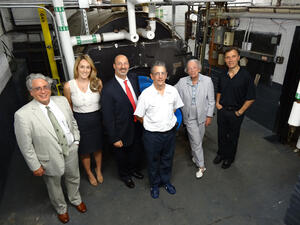Should You Switch from Oil to Gas Heat? How One Condo Made the Decision

At The Leonori: Presdient Lewis Kwit and Project Manager Amelia Axtell, Energy Investment Systems; Steve Furman, Rudd Realty; Gerald Nash, resident manager; and board members Anna Kaufman, Melchor Aunon
Sept. 25, 2012 — With natural gas prices falling and the city phasing out two of the dirtiest heating oils, Nos. 4 and 6, buildings are rushing to switch to natural gas. But switching is not simple. It requires coordination among various city agencies, private contractors and Con Ed. With requests up by 400 percent within the last three years, according to Con Ed, the system is overloaded. In 2010, Con Ed received 400 requests to convert. In the first half of 2012, it has received 1,200.
Should your co-op or condo approve such a switch? What are the factors to consider? What are the potential benefits — and the potential pitfalls? The story of how the condo board of The Leonori made the changeover can help other condo / co-op boards looking for a roadmap of how to make the decision.
Sense and Sustainability
The Leonori is a 13-story Beaux-Arts apartment building completed in 1901 and now home to a roster of celebrities including the actor Samuel L. Jackson, restaurateur Vittorio Assaf and former Morgan Stanley CEO John Mack.
With its storied history come the challenges of maintaining an older building. Many windows are old and drafty, light fixtures are inefficient, the boiler is nearly 30 years old and, until this spring, it used No. 6 heating oil.
So, in February 2010, residents began to reconsider their energy usage. Property manager Steven Furman of Rudd Realty suggested they begin with a sustainability audit. They could do the audit at the same time the building had its annual energy benchmark inspection as part of the new Local Law 84 requirement.
Kwit, While You're Ahead
A sustainability audit is a review of a building's energy usage and provides a blueprint for how a property can reduce its costs and carbon footprint. The Leonori turned to Lewis Kwit, president of Energy Investment Systems, an energy consulting firm. Kwit has done energy audits for eight Rudd Realty properties.
"When you walk around the building, it's impeccable," Kwit says. "But when you start scratching the surface, there are a lot of things the building can do to begin saving energy."
Kwit finished the audit in June 2010, after checking everything from roof to elevators to lighting. As part of the sustainability audit, Kwit used ultrasound technology to test the quality of the boiler. He decided that, although it was aging, it could last another few years with a new natural gas burner. He suggested the board buy a hot water heater, which cost $40,000. By using a hot water heater, the building could shut down the boiler in the warmer months, adding years to its life.
Overall, he offered a four-part plan:
- Convert to natural gas
- Add a separate hot water heater
- Submeter the building, and
- Replace light fixtures in the common areas with energy-efficient ones.
Kwit also discovered that an AT&T cell tower atop the roof was using the building's electricity and not paying Leonori. The condo is now suing AT&T. (See Habitat story "For Whom the Bill Tolls: Board Sues AT&T for 18 Years' Cell-Tower Electricity.")
The board gave Kwit the go-ahead on the natural gas conversion. It also agreed to replace the light fixtures, a $35,000 project that was completed in March 2011.
Photograph by Carol Ott
For more, see our Site Map or join our Archive >>
